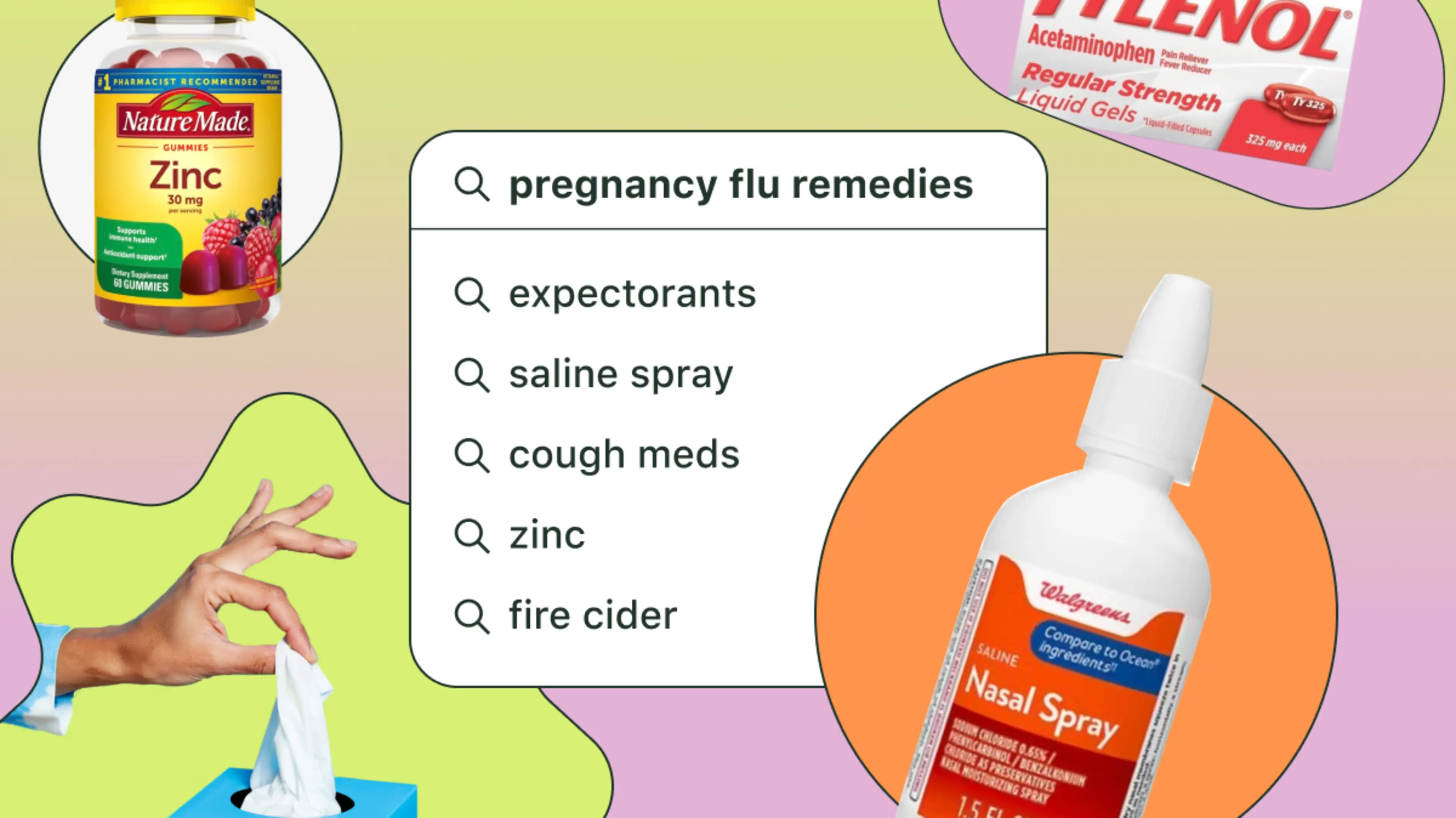The moment you’ve been dreading has finally happened—you’re pregnant and suddenly find yourself coughing, sneezing, and running a fever. Yuck. If you’re looking for relief from your symptoms, but feel a little nervous navigating the world of medications and remedies while expecting, you’re not alone.
It can be hard to figure out what’s safe and effective to take when you’re pregnant. You want to feel better—stat—but you also want to make sure anything you’re putting in your body is also good for your developing babe. We’ve got you covered. Here’s a breakdown of the meds and remedies that are both safe and that will really work, whether you’ve got a cold, flu, or any other nasty seasonal illness.
Expectorants
Coughing is no fun for anyone, but it can be particularly annoying when you’re pregnant. Expectorants are medications that can provide some relief by helping your body thin music and expel it, but you should only use them during the second and third trimesters.
Mucinex is a common expectorant that you can use, but if you want to shop around, the ingredient you want to look for is guaifenesin. The key to expectorant safety is to make sure the medication you get has only guaifenesin as an active ingredient (like plain old Mucinex rather than a fancy combo version). You want to stay away from combination cold/flu meds as they may have other things added that may or may not be safe for pregnancy, says Aubre Tompkins, nurse midwife, herbalist, and clinical director of Seasons Community Birth Center in Thornton, CO.
Cough Medicine
OTC medications that help you stop coughing can be okay in pregnancy, too. For example, dextromethorphan1 (the active ingredient in cough syrups like Robitussin) has not been found to increase the risk of miscarriage or birth defects (though there hasn't been a ton of research on it yet). What it has been found to do is soothe that achy feeling in your lungs by giving you a little relief from the nonstop coughing. The only caveat is cough medicine is another medication that you will want to avoid in the first trimester.
Pain Medicine
Acetaminophen (brand name Tylenol) is the safest and most effective fever reducer and pain medication to take during pregnancy. While it isn’t a great idea to take acetaminophen every day, it’s fine to use for a short-term illness.
Remember: if you are taking any over-the-counter medication for cold or flu symptoms while pregnant, it’s best to take single medications rather than combinations whenever possible. While acetaminophen is generally included in cold/flu combo meds, make sure you’re taking plain old Tylenol instead.
Saline Sprays and Nose Steams
Unfortunately, decongestants are not safe to take while pregnant. But a gentler alternative that Tompkins says is totally safe to use to clear your nose and sinuses is saline. So plan to load up that neti pot or try a saline nose spray when you’re feeling stuffed up.
Another option Tomkins recommends is a steam, in which you boil water and stick your head over the pot under a blanket to inhale steam into your nose and mouth. Plain, salted water will get the job done, but think about also adding other aromatic herbs, like rosemary or peppermint that will feel and smell great in a steam. (Note that peppermint should be used with caution after you give birth and if you are breastfeeding as there are some indications that it can suppress milk production.)
Gargling with Salt Water
Don’t forget that simple saline can soothe an aching throat, too. Warm some water and dissolve salt in it, then gargle. Add lemon and honey if you feel so inclined. It’s safe to do this a few times a day.
Fire Cider
Fire cider is a folk remedy that’s often used to prevent or treat a cold or flu. Most often, fire cider is made by combining food ingredients like onion, garlic, ginger, jalapeño, cayenne, horseradish, honey, citrus fruits, and more with apple cider vinegar. The entire mixture sits for a few weeks, then you strain the liquid and drink it as needed. Dosage is usually 1-2 tablespoons or up to a shot glass’ worth when symptoms are acute.
While there’s no real research on fire cider itself, there is plenty of evidence that ingredients like garlic, honey, ginger, and more can support your body in preventing or healing from illness. And at the very least, taking some spicy fire cider can help open up those clogged sinuses!
You should be able to find it at your local Whole Foods or other natural grocer, but the beauty of it, as Tompkins explains, is that you can easily make it yourself with ingredients found at the grocery store. Read a few recipes and find one that you like, then make a batch. When you feel the sniffles coming on, you’ll have it on hand!
Zinc
Zinc is a mineral that’s well-known for modulating the immune system2 and reducing inflammation, and Tompkins often recommends it to her pregnant clients when they’re sick. She says, “Zinc is an excellent way to help support the immune system in a gentle, but effective way. It will support without overstimulating the body.”
Honey
Enjoying some honey during your illness may actually help your body fight off the germs. Honey has antibacterial and anti-inflammatory properties, as per a review of clinical research3 on the sweet stuff. A spoonful of honey before bed can ease a cough and it’s delicious stirred into hot water or tea.
Herbal teas
Tompkins says any cold or flu herbal tea you can buy at the grocery or natural food store is likely pretty safe for pregnancy—and that teas in general often don’t have enough plant material to pose any risk to a developing fetus (or its tired parent!). However when you are pregnant, try to avoid cold/flu tea blends that contain echinacea, yarrow, and tulsi.
If you like, you can visit your local herb store and ask them to recommend a pregnancy-safe blend for respiratory support, fever relief, or to soothe any other symptoms you’re having. One of the main benefits of drinking tea is that you’re also getting additional hydration. As Tompkins says, “It's a warm beverage that is soothing your throat and nasal passages, too! A win-win!”
Rest and hydration
Tompkins stresses that the most important thing you can do when you’re expecting and under the weather is rest and hydrate. When you’re sick, you burn through fluids, so make some tea, keep that water bottle filled, and curl up on the couch for a good long nap.
If you have specific questions about medications that you can use while pregnant, confer with your doctor or midwife on your individual situation. Here’s hoping you feel better—and fast!











